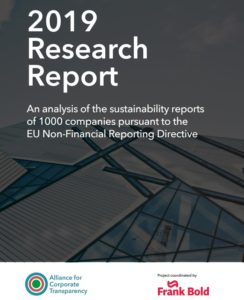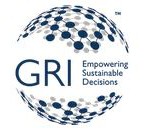
The Alliance for Corporate Transparency, a collaborative initiative launched by Frank Bold, analysed the information that companies disclosed on their environmental and societal risks and impacts following the requirements introduced by the EU Non-Financial Reporting Directive. The research arrives at the same time that the EU Commission initiates the process to reform the law and after Executive Vice President Vadis Dombrovskis announced plans to create EU standards for corporate sustainability reporting.
The poor quality and comparability of corporate disclosures hinder the efforts to scale up sustainable finance as investors do not have reliable information to inform their decisions. This leaves major financial risks stemming from sustainability challenges, especially climate change, unaccounted for in investor and corporate strategies, as well as important social and environmental impacts unaddressed.
The research of the Alliance for Corporate Transparency provides clear insights into the key gaps in corporate reporting practice that need to be addressed.
Key findings
Common problems:
- Disclosures are not specific enough to enable understanding of a company’s position and future developments. Reports focus on presenting general policies and commitments (80-90% for key issues such as climate, human rights, and anti-corruption), but not concrete targets, outcomes of policies with respect to these targets, and specific information on risks and impacts (20% on average).
- Only 22% of companies provide their key performance indicators in summarised statements. This is in stark contrast with the way financial indicators are presented.
- The numbers above focus merely on whether disclosures are specific, but not whether they include relevant information. Examples of qualitative criteria that provide insights into the relevance of disclosures are provided below.
Climate
- 13.9% of companies report on alignment of their climate targets with the Paris agreement goals (i.e. to keep global warming well below 2 deg Celsius). This number is higher in the Energy & Resource Extraction sector (23.5%), but still more than three quarters of the most impactful companies don’t report on their targets and plans in this context.
- Just 23.4% (that is less than half of them) provide specific information that allows readers to understand the climate-related risks they are facing – out of 53.8% reporting that they recognize the existence of such risks. Only 6.6% clearly consider the risks with regard to the transition to a well below 2 deg Celsius scenario. The term climate risks encapsulates so called transition risks (technological challenges and regulatory risks) as well as physical risks.
- Only 13.4% of financial companies provide details on the exposure of their portfolios to the most polluting sectors.
Human rights
- 22.2% of companies provide some information on their human rights due diligence process, despite 82.8% reporting a human rights policy. Human rights due diligence is the basic element of corporate responsibility to respect human rights. It is recommended by the UN, EU as well as a number of individual States.
- 25.5% of companies disclose specific human rights risks facing them (out of 56.6% that acknowledge the existence of such risks), yet only 14.6% report on the actual impacts, and merely 3.6% explain the outcomes of the management of the risks
- 13.6% of companies in the Apparel & Textiles (the definition includes footwear companies) do disclose their ultimate suppliers in high-risk countries for human rights, which is a major improvement
Anti-Corruption
- A vast majority (88.1%) of companies report on anti-corruption policies, but only 33.7% describe how these are implemented.
- Fewer companies specify how their policies apply to their business partners (39.5%), and fewer to the agents authorised to act on behalf of the company (25%)
- Just 18.3% of companies disclose if they conduct risk assessment of potential areas for corruption)
Country conclusions: There is not a major difference between different European regions, with the exception that companies from former Eastern Europe lag behind. Nordic companies tend to be among the regions that report more specific information than others, but not by a great margin (the biggest margin is in certain human rights indicators – 33.4% of Nordic companies disclose actions taken to address risks compared to 19.4% average). French companies on average provide slightly better information on strategy for climate change (24.41% inform on their climate targets in relation to Paris Agreement goals compared to a 13.9% average).
Full results available in public database:
allianceforcorporatetransparency.org/database
“The results of the research show that existing EU legislation is not meeting its objectives and it seems that the only way to address the problem is to specify what companies should be reporting. We need to be careful not to provide criteria that are too detailed or to over-regulate companies, but there is a clear space and need for very targeted sector-specific clarifications on mandatory requirements for reporting” —Filip Gregor, Head of Responsible Companies at Frank Bold
More testimonial/videos from experts on the future development of the EU Non-Financial Reporting Directive are available here.
Background:
Under the EU Non-Financial Reporting Directive, large listed companies, banks and insurers in the EU are obliged to report information necessary to understand their policies, risks and impacts on sustainability matters. The law, which entered into effect in 2018, failed to provide the specificity required to ensure that useful and relevant disclosures are made by companies.
Reliable information on sustainability is indispensable to enable European banks and investors to factor climate, environmental and social risks in their decisions. This in turn underpins the EU’s ability to transform the economy in order to address climate change, stop environmental degradation, and avoid capitalising on human rights violations in global value chains.
The European Commission is expected to present a renewed sustainable finance strategy later this year that will build on its previous Sustainable Finance Action Plan to reorientate capital flows and mitigate financial risks facing the European economy stemming from climate change. Corporate transparency is the first level to ensure that these plans succeed.
The Alliance for Corporate Transparency is a civil society led project coordinated by Frank Bold (a public interest law organisation). The objective of the project is to provide data and evidence-based recommendations to support the development of EU legislation and drive the debate on the standardisation of corporate sustainability reporting.
Project members include: Frank Bold, WWF, Transparency International, Business and Human Rights Resource Centre, CORE Coalition, Future-Fit Foundation, Sustentia, ClientEarth, Shift, CDP Europe, Stockholm Environment Institute, Themis Research, Oxfam, ShareAction, Germanwatch, SOMO, Climate Disclosure Standards Board.
Download the full report (pdf)



